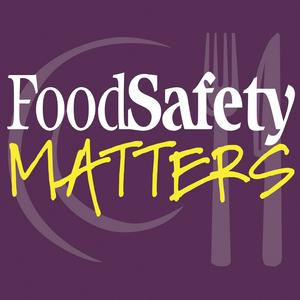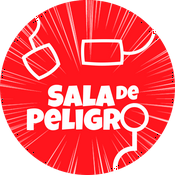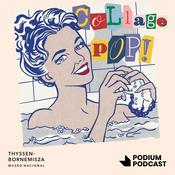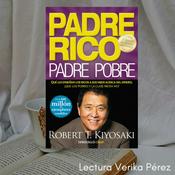273 episodios

Ep. 209. Helena Bottemiller Evich: The MAHA Effect on American Food Policy
13/1/2026 | 51 min
Helena Bottemiller Evich is the Founder and Editor-in-Chief of Food Fix. She previously led coverage of food and agriculture at POLITICO for nearly a decade, winning numerous awards for her work, including a prestigious George Polk Award for a series on climate change and two James Beard Awards for features on nutrition and science. In 2022, she was a James Beard Award finalist for a deep dive on diet-related diseases and COVID-19. Helena is also a sought-after speaker and commentator on food issues, appearing on CNN, MSNBC, CBS, BBC, NPR, and other outlets. Her work is widely cited in the media and has also been published in the Columbia Journalism Review and on NBC News. In this episode of Food Safety Matters, we speak with Helena [2:58] about: The newly released Dietary Guidelines for Americans 2025–2030 and their much-debated details, such as their saturated fats advice and focus on "highly processed foods" Contention around the undecided definition for "ultra-processed foods" (UPFs), and what the use of "highly processed foods" instead of UPFs in the revised DGAs could imply The differences in FDA's structure and its unique challenges today (e.g., facing the 2025 infant botulism outbreak linked to ByHeart formula) versus 2022, during the Cronobacter sakazakii/Abbott Nutrition infant formula crisis and before the establishment of FDA's Human Foods Program The rise of "Make America Healthy Again" (MAHA), from a grassroots movement to an official White House-backed agenda with bipartisan support, and the implications for the food space The question within the Trump Administration of whether MAHA rhetoric will translate into real policy changes that advance MAHA objectives Shortcomings of the MAHA approach to food safety policy and regulation, particularly a lack of focus on microbiological safety and inconsistent handling of chemical safety Why the MAHA agenda may not succeed with a deregulatory approach and a weakened federal workforce and resources How the Trump Administration's moves in 2026 may determine if MAHA will remain in the forefront of public discussion, moving forward. News and Resources Eat Real Food: New U.S. Dietary Guidelines Name and Shame 'Highly Processed Foods' Food Fix We Want to Hear from You! Please send us your questions and suggestions to [email protected]

Yiannas, McDonald, Besser, Hedberg: Fixing the Outbreak Investigation System
30/12/2025 | 1 h 16 min
Frank Yiannas, M.P.H. is a renowned food safety leader and executive, food system futurist, author, professor, past president of the International Association of Food Protection (IAFP), and advocate for consumers. Most recently, he served under two different administrations as the Deputy Commissioner for Food Policy and Response at the U.S. Food and Drug Administration (FDA), a position he held from 2018–2023, after spending 30 years in leadership roles with Walmart and the Walt Disney Company. After retiring from FDA, Mr. Yiannas founded Smarter FY Solutions to help organizations address critical food safety and supply chain challenges. He also advises several well-known companies, offering consultancy services to modernize compliance strategies and ensure that clients meet regulatory requirements and industry standards. Throughout his career, Mr. Yiannas has been recognized for his role in strengthening food safety standards in new and innovative ways, as well as building effective food safety management systems based on modern, science-based, and tech-enabled prevention principles. Drew McDonald is the Senior Vice President of Quality and Food Safety at Taylor Fresh Foods in Salinas, California, where he oversees the quality and food safety programs across the foodservice, retail, and deli operations under both FDA and U.S. Department of Agriculture (USDA) jurisdictions. Mr. McDonald works with an impressive team developing and managing appropriate and practical quality and food safety programs for fresh food and produce products. He has more than 30 years of experience in fresh produce and fresh foods. Over the course of his career, Mr. McDonald has worked with growers and processors of fresh food and produce items across the globe. He currently serves on numerous food safety-related technical committees and has participated in the authorship of many produce safety articles and guidelines. He serves on the Food Safety Summit Educational Advisory Board and is a former chair of the Center for Produce Food Safety's Technical Committee and United Fresh's Technical Council. Mr. McDonald received his education from Lawrence University in Wisconsin. John Besser, Ph.D. worked for ten years as Deputy Chief of the Enteric Diseases Laboratory Branch at the U.S. Centers for Disease Control and Prevention (CDC), where he was involved in national and global programs to detect, characterize, and track gastrointestinal diseases. Prior to CDC, Dr. Besser led the infectious disease laboratory at the Minnesota Department of Health (MDH) for 19 years and served as a clinical microbiologist at the University of Minnesota Hospital for five years. He currently works as an independent contractor and consultant. Dr. Besser is the author or co-author of more than 70 publications. He received his Ph.D. and M.S. degree from the University of Minnesota. Craig Hedberg, Ph.D. is a Professor in the Division of Environmental Health Sciences at the University of Minnesota and Co-Director of the Minnesota Integrated Food Safety Center of Excellence. He promotes public health surveillance as a prerequisite for effective food control, and his work focuses on improving methods for collaboration among public health and regulatory agencies, academic researchers, and industry to improve foodborne illness surveillance and outbreak investigations. With a background in public health practice, Dr. Hedberg also focuses on public health workforce development and works with state, local, and tribal public health partners to build capacity for preparedness and emergency response. He is a member of the Council of State and Territorial Epidemiologists, the Minnesota Environmental Health Association, and IAFP. Dr. Hedberg holds a Ph.D. in Epidemiology and an M.S. degree in Environmental Health, both from the University of Minnesota. In this episode of Food Safety Matters, we speak with Mr. Yiannas, Mr. McDonald, Dr. Besser, and Dr. Hedberg [6:43] about: The increasing rate of food recalls issued by federal regulatory agencies, and what that might imply about the current systems for outbreak investigation and disease surveillance How federal and state public health agencies conduct foodborne illness outbreak investigations and the current success rates of these investigations Elements of the foodborne illness outbreak investigation process that are working well Potential areas for improvement for foodborne illness outbreak investigations and the metrics for "success" An idea for a National Foodborne Outbreak Investigation Board, similar to the model used for airlines with the National Transportation Safety Board, and how such a system might help improve food safety in the U.S. Sponsored by: Michigan State University Online Food Safety Program We Want to Hear from You! Please send us your questions and suggestions to [email protected]

Ep. 208: Reviewing 2025—A Year of Change for Food Safety Policy
23/12/2025 | 1 h 31 min
In this episode of Food Safety Matters, we discuss the top food safety stories of 2025 and their implications. We cover: The Trump Administration's impact on federal agencies overseeing food safety [7:52]: FDA, CDC Ordered to Temporarily Pause All External Communications, Obtain Trump Admin Approval RFK Jr. Confirmed as HHS Secretary; Widespread Firings Coming to FDA, CDC USDA Inspector General Phyllis Fong Dismissed by Trump Administration Brooke Rollins Confirmed as Secretary of Agriculture, Cites 'Aggressive Plan' to Eliminate USDA Jobs FDA Leader Jim Jones Resigns After 89 'Indiscriminate' Firings in Human Foods Program Attorney Kyle Diamantas Expected to Replace Jim Jones as FDA Deputy Commissioner of Human Foods FDA Spending Freeze Leaves Staffers Feeling 'Dangerously Unprepared' for Next Foodborne Illness Outbreak Federal Workforce Data Reveal Impact of Trump Admin RIFs on USDA Food Safety Expertise More Than 15,000 USDA Employees Take Trump Administration's Resignation Offer FDA Suspends Milk Quality Testing Amid Health and Human Services Cuts Entire Departments of CDC Outbreak Experts Fired, Rehired During Shutdown RIFs FDA Reportedly Reinstating Some Fired Food Safety Scientists, Inspection Support Staff Government Shutdown Affects Food Safety: HHS Furloughs Employees, FDA Pauses CORE Investigation Table Ep. 196. Dr. Lane Highbarger: How the FDA Workforce Cuts May Impact Food Safety Dozens of Prominent Food Safety Stakeholders Call for Reinstatement of NACMCF and NACMPI USDA Withdraws Proposed Regulatory Framework for Salmonella in Poultry After Years of Development USDA Indefinitely Delays Enforcement of Salmonella as Adulterant in Raw Breaded, Stuffed Chicken CDC Slashes FoodNet Surveillance From Eight Foodborne Pathogens to Two Public Health Professionals, Groups Demand Resignation of HHS Secretary RFK Jr. Trump-Appointed CDC Director Dr. Susan Monarez Fired After Clashes With Secretary Kennedy RFK Jr.'s Second in Command Named CDC Acting Director Following Sudden Firing Federal Layoffs to Hit HHS Amid Government Shutdown, May Affect Food Safety Staffers FDA Delays FSMA 204 Traceability Rule Compliance Date by 30 Months States and the "Make America Healthy Again" (MAHA) movement declare war on "toxic" food chemicals and ultra-processed foods (UPFs) [27:52]: FDA Announces Plan to Phase Out Synthetic, Petroleum-Based Food Dyes From U.S. Food Supply Bonus Episode: Diamantas and Choiniere: FDA Focuses on Produce Safety, MAHA, Culture, and More MAHA Report Sets Stage for Overhaul of Food Chemicals, Environmental Contaminants, and Childhood Nutrition What the Final MAHA Report Could Mean for Food Safety FDA Announces 'Proactive' Post-Market Chemical Review Program to Keep Food Supply Safe FDA Adds Six Artificial Food Dyes to List of Chemicals Under Post-Market Review FDA to Issue Proposed Rule Tightening GRAS Oversight FDA's Developing Rule to Tighten GRAS Oversight Moves to White House FDA, USDA Issue Joint RFI to Address the Risks of Ultra-Processed Foods California Enacts Law Defining Ultra-Processed Foods, Will Ban UPFs in Schools Food Industry Stakeholders Share Input on FDA, USDA's Intent to Define UPFs MAHA Pushback Kills 'Big Food'-Aligned Legislative Effort to Stop State Food Laws Industry Giants Support New Coalition Aimed at Stopping MAHA-Aligned State Food Additive Bans More Than 80 Groups Urge Congress Not to Block State Food Additives Bans Ep. 187. Rainer and Coneski: Evolving Legislation Around Food Packaging Chemicals and Additives—Implications for Industry Ep. 199. George Misko: The Future of Food Regulation Under MAHA Ep. 162. Brian Sylvester: How the California Food Safety Act is Shaping U.S. Food Additives Regulation Ep. 207. Brian Sylvester: Preparing for 'MAHA'-Driven Policy Changes on Food Dyes, UPFs, GRAS FDA's focus on infant formula safety and the infant botulism outbreak linked to ByHeart formula [57:44]: FDA Publishes Long-Term Strategy to Increase Resiliency of U.S. Infant Formula Market FDA Launches 'Operation Stork Speed' to Improve Infant Formula Safety, Including Contaminant Testing Infants Nationwide Hospitalized With Botulism After Consuming ByHeart Formula ByHeart Outbreak Grows: 31 Infants in 15 States Hospitalized for Botulism From Tainted Formula Infant Botulism Spike Exceeds 100 Cases, Extent of ByHeart's Involvement Unclear A History of Food Safety Failures at ByHeart, the Formula Company Behind Infant Botulism Outbreak ByHeart Finds Widespread Contamination in Infant Formula as Botulism Outbreak Grows; FDA Publishes Inspection Reports Coalition Urges RFK Jr. to Fix Infant Formula Oversight Problems that Allowed Infant Botulism Outbreak FDA Urges Industry to Improve Recall Efficiency After Delay in Removing ByHeart Formula from Stores Emerging science on Listeria monocytogenes and biofilms [1:08:26]: Study Shows Water Hoses as Reservoirs for Biofilms in Food Processing Facilities Study Demonstrates Listeria's Ability to Colonize, Survive in Preexisting Multispecies Biofilms First-of-its-Kind Study Shows How Listeria Strains Evolve Into Strong Biofilm Formers Study Explores Sanitizer Limitations Against Listeria Biofilms in Leafy Greens Production Listeria From Multispecies Biofilms More Prone to Growth in RTE Foods, Study Shows Study Shows Combining Antimicrobial Blue Light and Chemical Sanitizers Can Enhance Listeria Inactivation FAO/WHO Developing Risk Assessment Models for Listeria in Four Food Commodity Groups The ongoing Highly Pathogenic Avian Influenza H5N1 (HPAI H5N1) outbreak in U.S. dairy cattle and poultry flocks and continued monitoring to ensure food safety [1:14:09]: California Declares State of Emergency Over HPAI H5N1 Outbreak in Dairy Cows USDA Begins Five-Part National Milk Testing Strategy for HPAI H5N1 USDA Extends H5N1 Testing in Dairy Cattle; EU Releases Guidance on Avian Flu Prevention CDC: Avoid Consuming Raw Milk, as Risk of Bird Flu Infection is Low but Possible FDA-Backed Study Shows Aging Raw Milk Cheese Does Not Inactivate Avian Flu, but Low pH Helps Study Shows Avian Flu Does Not Pose Food Safety Risk in Various Pasteurized Dairy Products USDA to Invest in Farm Biosecurity, Chicken Vaccinations to Combat Avian Influenza Study Shows Acidification is Inexpensive, Easy Way to Inactivate Bird Flu in Raw Waste Milk FDA Now Requires Raw Pet Food Manufacturers to Consider HPAI in Food Safety Plans House Cat Dies After Eating Raw Pet Food Contaminated With HPAI H5N1 FDA-Backed Study Shows Aging Raw Milk Cheese Does Not Inactivate Avian Flu, but Low pH Helps H5N1 and the Growing Risk to Food Safety—Why Raw Milk Requires Special Attention FDA Begins Testing Assignment for HPAI H5N1 in Aged Raw Cow Milk Cheese FAO Encourages All Countries to Monitor for HPAI H5N1 Spread to Cattle Dutch Field Studies Show Promise for Two Experimental Avian Flu H5N1 Vaccines Federal Workforce Data Reveal Impact of Trump Admin RIFs on USDA Food Safety Expertise Growing artificial intelligence (AI) applications for food safety [1:17:57]: FAO Report Highlights Needs for Responsible AI Adoption in Food Safety Fields FDA Announces Completion of First AI-Assisted Scientific Review Pilot and Agency-Wide AI Rollout Timeline Using AI, Researchers Offer Promising Real-Time Mycotoxin Detection Method for Foods Big Data, AI, and the Coming Philosophical Challenges with Food Safety Welcome to the Machine: AI and Potential Implications for the Food Industry Ep. 193. Christian Ararat: A Global Perspective on Auditing, Certifications, AI, and Beyond Ep. 205. Black and Gabor: Digital Transformation and Emerging International Standards for Food Safety We Want to Hear from You! Please send us your questions and suggestions to [email protected]

Ep. 207. Brian Sylvester: Preparing for 'MAHA'-Driven Policy Changes on Food Dyes, UPFs, GRAS
09/12/2025 | 1 h 10 min
Brian P. Sylvester, J.D. is a Partner and Head of Food Regulatory in Morrison Foerster's FDA and Healthcare Regulatory and Compliance Group, and is an influential thought leader and practitioner in food tech regulation. Brian counsels clients across the full lifecycle of regulated products, serving global brands, startups, life sciences companies, investors, and trade associations. In the area of food and beverage, Brian develops regulatory strategies to commercialize a range of food tech innovations, including transgenic crops and alternative proteins, such as cultivated meat and fermentation-derived food ingredients, among others. He has been recognized by several legal industry awards and publications such as Chambers USA, Bloomberg Law, and The National Law Journal. In this episode of Food Safety Matters, we speak with Brian [35:44] about: State-level food additive regulatory developments since the passage of the California Food Safety Act in October 2023 How the "Make America Healthy Again" (MAHA) movement is shaping federal food additive and nutrition regulations Challenges and questions that arise from the growing number of state-level food regulations, including legality and constitutionality, implications for interstate commerce, and ensuring compliance Industry responses to FDA's push to phase out synthetic food dyes from the U.S. food supply California's recently passed legislation to establish a legal definition for ultra-processed foods (UPFs), and how it might affect a federally recognized UPF definition to be established in the future Practical recommendations for companies navigating the rapidly evolving U.S. regulatory landscape around food. News and Resources News USDA Indefinitely Delays Enforcement of Salmonella as Adulterant in Raw Breaded, Stuffed Chicken [4:41] Contamination in Infant Formula as Botulism Outbreak Grows; FDA Publishes Inspection Reports [18:38] Unsolved German E. coli Outbreak Grows, Sickening Hundreds [28:52] Codex Commission Adopts New International Food Standards at 48th Session [32:37]Codex Committee Discussions Held at CAC48 Cover Key Fishery Initiatives Resources Ep. 162. Brian Sylvester: How the California Food Safety Act is Shaping U.S. Food Additives Regulation We Want to Hear from You! Please send us your questions and suggestions to [email protected]

Ep. 206. Jay Berglind: In Fearless Pursuit of Safer Eggs and Food Safety Innovation
25/11/2025 | 54 min
Jay Berglind is a nationally respected food safety expert and the principal of Aegis Foods, a consultancy focused on strengthening food safety systems across the supply chain. Aegis Foods is also the maker of Fearless Eggs, the only pasteurized in-shell and poached eggs that are safe to eat raw. With more than 25 years of experience in food manufacturing, regulatory compliance, and quality assurance, Jay is a trusted voice on preventing foodborne illness, understanding federal regulations, and responding to product recalls. Jay has served in leadership roles overseeing food safety and quality programs for major U.S. food manufacturers. His expertise spans U.S. Department of Agriculture (USDA) and U.S. Food and Drug Administration (FDA) inspection standards, Hazards Analysis and Critical Control Points (HACCP), and third-party audit preparation. Through Aegis Foods, he now advises clients on building proactive, recall-resistant systems that prioritize both consumer health and brand integrity. In this episode of Food Safety Matters, we speak with Jay [38:36] about: The history of Jay's career and how his experiences led to the creation of Fearless Eggs The science behind the pasteurization method used by Fearless Eggs and how it differs from traditional shell egg pasteurization, as well as Fearless Eggs' latest innovation, the in-shell poached egg How Fearless Eggs' pasteurization method inactivates Salmonella and other food safety hazards like avian influenza The process of working with FDA to get Fearless Eggs' pasteurization method approved The consumer trust built not only by Fearless Eggs' pasteurization, but also its prioritization of food safety Jay's perspective on the Trump Administration's resource and staffing cuts to FDA and the effect on consumer confidence in the safety of the U.S. food supply How Aegis and Fearless Eggs are helping move the entire industry toward safer egg products and food safety innovation Where to find Fearless Eggs products. News and Resources News ByHeart Outbreak Grows: 31 Infants in 15 States Hospitalized for Botulism From Tainted Formula [4:29] ByHeart Formula Now Linked to 23 Infant Botulism Cases in 13 States Infants Nationwide Hospitalized With Botulism After Consuming ByHeart Formula Regan-Udall Report Supports FDA Infant Formula Safety Efforts [16:16] Analysis Shows FDA Foreign Facility Inspections Hit Historic Low After Trump Admin Cuts [23:02] First-of-its-Kind Study Shows How Listeria Strains Evolve Into Strong Biofilm Formers [31:44] FAO Report Highlights Needs for Responsible AI Adoption in Food Safety Fields [35:01] Resources Webinar: Dry Sanitation and Cleaning Techniques for Facilities and Equipment We Want to Hear from You! Please send us your questions and suggestions to [email protected]
Más podcasts de Arte
Podcasts a la moda de Arte
Acerca de Food Safety Matters
Escucha Food Safety Matters, Audiolibro En Español y muchos más podcasts de todo el mundo con la aplicación de radio.es

Descarga la app gratuita: radio.es
- Añadir radios y podcasts a favoritos
- Transmisión por Wi-Fi y Bluetooth
- Carplay & Android Auto compatible
- Muchas otras funciones de la app
Descarga la app gratuita: radio.es
- Añadir radios y podcasts a favoritos
- Transmisión por Wi-Fi y Bluetooth
- Carplay & Android Auto compatible
- Muchas otras funciones de la app


Food Safety Matters
Descarga la app,
Escucha.






































